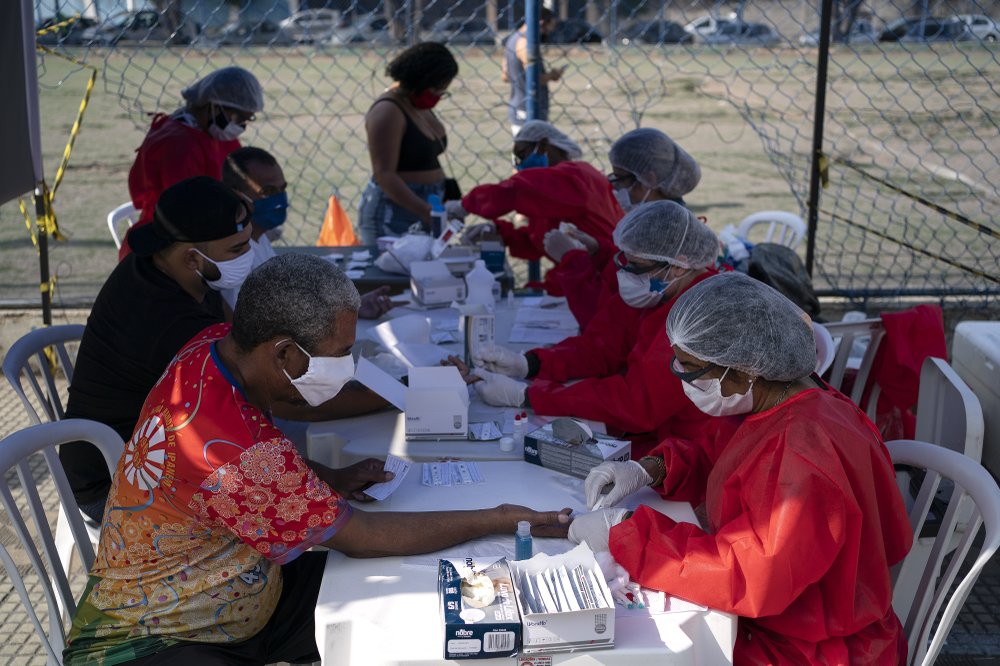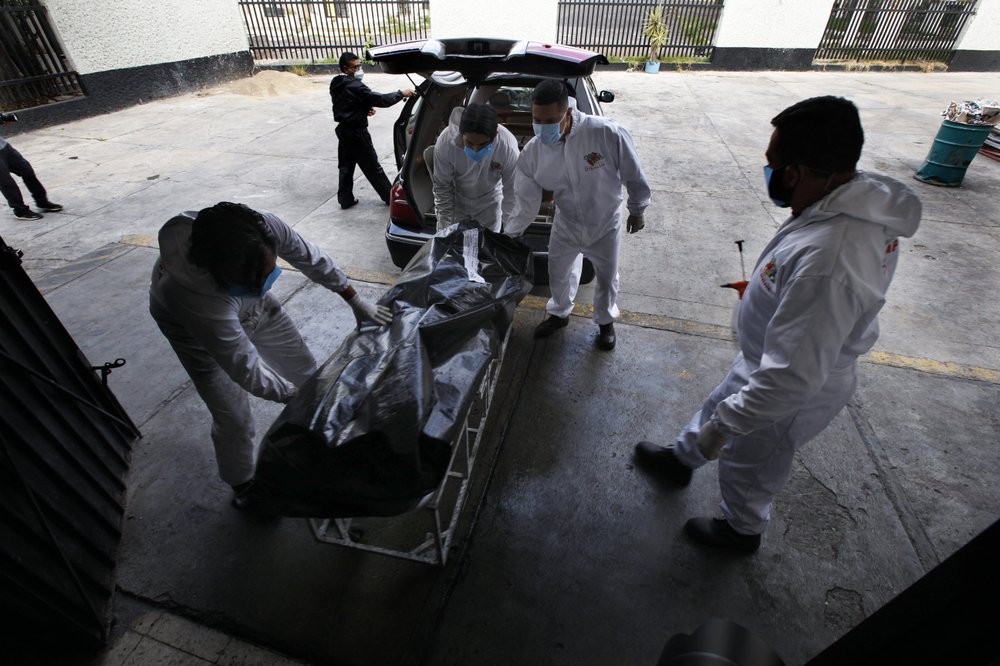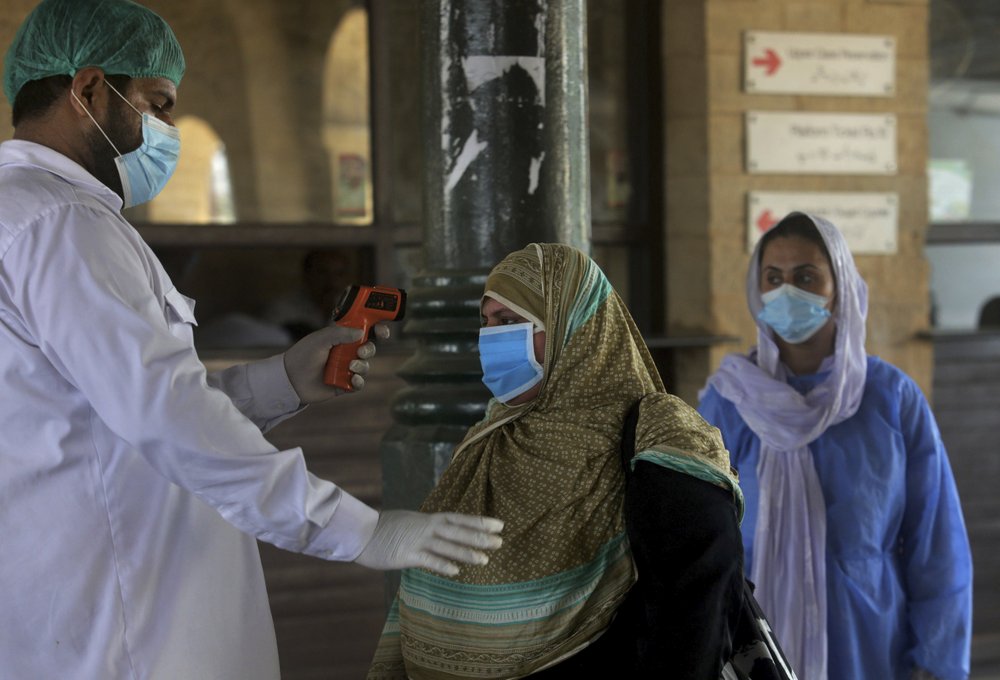Editor's note: This is the 73rd article in the COVID-19 Global Roundup series. Here is the previous one.
As many countries gingerly downgrade their lockdown measures in order to resume the social-economic life disrupted by the coronavirus, some under-developed regions with shaky healthcare systems can undermine the overall efforts to end the pandemic around the globe.

A healthcare worker takes a blood sample from a man to test for COVID-19 amid the new coronavirus pandemic at a plaza in Duque de Caxias, Brazil, on June 8, 2020.
A healthcare worker takes a blood sample from a man to test for COVID-19 amid the new coronavirus pandemic at a plaza in Duque de Caxias, Brazil, on June 8, 2020.
More developed countries in Europe and North America hit first by the pandemic are gradually resuming the normal economic activities and people's daily life as the number of new infections seems to be under control. Additionally, they are training armies of contact tracers to hunt down cases, designing tracking apps and planning virus-free air travel corridors.
Countries like Brazil, Mexico, South Africa, India and Pakistan, which can no longer afford an disrupted economy, are also easing their epidemic restrictions, but way before the outbreaks are under control, let alone to set up detailed surveillance systems.
"Doing that is extremely worrying because then you will build up a highly resentful and angry population, and it's unknown how they will react," said Dr. Bharat Pankhania, an infectious diseases expert at the University of Exeter in Britain.
And as nearly every developed country struggles with its own outbreak, there may be fewer resources to help those with long overstretched capacities.
Tedros Adhanom Ghebreyesus, director-general of the World Health Organization, said Monday the pandemic was "worsening" globally, noting that countries on Sunday reported the biggest-ever one-day total - more than 136,000 cases. Among those, nearly 75 percent of the cases were from 10 countries in the Americas and South Asia.
In many poor regions where crowded slums and streets mean even basic measures like hand washing and social distancing are difficult to follow, the coronavirus is exploding now that restrictions are being removed. Last week, Brazil, Mexico, South Africa, India and Pakistan saw one-day records of new infections or deaths as they reopened public spaces and businesses.
Related readings:
India reopens more public spaces despite record virus infections
Brazil reopening despite record COVID-19 deaths
Pakistan eases quarantine policy for inbound passengers, reopens tourism

Workers move the body of a COVID-19 victim to a crematorium inside the Panteón San Nicolás Tolentino cemetery in the Iztapalapa neighborhood of Mexico City, Mexico, June 2, 2020. /AP
Workers move the body of a COVID-19 victim to a crematorium inside the Panteón San Nicolás Tolentino cemetery in the Iztapalapa neighborhood of Mexico City, Mexico, June 2, 2020. /AP
Clare Wenham of the London School of Economics described the situation in Brazil as "terrifying," noting the government's decision to stop publishing a running total of COVID-19 cases and deaths.
"We've seen problems with countries reporting data all over the world, but to not even report data at all is clearly a political decision," Wenham said. That could complicate efforts to understand how the virus is spreading in the region and how it's affecting the Brazilian population, she added.
Johns Hopkins University numbers showed Brazil recorded more than 36,000 coronavirus deaths Monday, the third-highest in the world, just ahead of Italy. There were nearly 707,412 cases, putting it second behind the U.S.
Rio de Janeiro allowed surfers and swimmers back in the water and small numbers of beach-goers were defying a still-active ban on gathering on the sand.
Relaxing restrictions "is dangerous because we're still at the peak, right? So it's a little dangerous," said Alessandra Barros, a 46-year-old cashier on the sidewalk next to Ipanema beach. "Today it's calm, but this weekend will be crowded."
In Mexico, President Andrés Manuel López Obrador urged the country to stay calm after officials last week reported escalating fatalities that rivaled those in Brazil or the U.S.
"Let there not be psychosis, let there not be fear," López Obrador said, while accusing the media of fanning concerns of an escalating crisis.
Across Latin America, countries that cracked down early and hard, like El Salvador and Panama, have done relatively well, although some of that has come at the expense of human rights and civil liberties, Wenham said.
"Countries willing to take the short-term hit are the ones coming out better," she said, adding that poor countries weren't entirely without options, noting early, pre-emptive actions by Sierra Leone and Liberia.

A railway worker checks the body temperature of a woman wearing a mask on her arrival at a railway station in Karachi, Pakistan, June 6, 2020. /AP
A railway worker checks the body temperature of a woman wearing a mask on her arrival at a railway station in Karachi, Pakistan, June 6, 2020. /AP
"They learned from the Ebola outbreak and moved quickly when they decided their economy couldn't cope with community transmission," she said. So far, numbers have been relatively low in both West African countries.
South Africa's cases are "rising fast," according to President Cyril Ramaphosa. More than half of its approximately 48,000 confirmed cases have been recorded in the last two weeks, prompting concerns that Africa's most developed economy could see a steep rise in infections shortly after restrictions are relaxed.
MacDermott said the surge of COVID-19 in many developing countries suggests "we will potentially struggle more to get on top of it," and that the virus might persist long after developed countries bring it under control.
"That could result in very stringent travel measures on those parts of the world where the virus is still circulating," she said.
In Pakistan, the number of infections continued to rise as Prime Minister Imran Khan said the country's poorest cannot survive a strict lockdown after easing restrictions last month.
After refusing to close mosques and opening up the country even as medical experts pleaded for stricter measures, Pakistan's caseload soared Tuesday to 108,317, with 2,172 deaths. Still, authorities shut down thousands of shops and markets nationwide last week in raids of those violating social distancing regulations.
Some experts say lockdowns were always "panic measures" and not designed to be sustainable, particularly in developing countries.
Even tiny Panama, once Latin America's fastest-growing economy, is struggling to maintain some of the region's tightest controls amid simultaneous economic slowdown and disease spread.
"It's impossible to maintain a quarantine for all of 2020," said Dr. Xavier Sáenz-Llorens, a government adviser on the disease response. "The country would sink."
(With input from agencies)